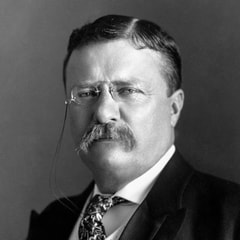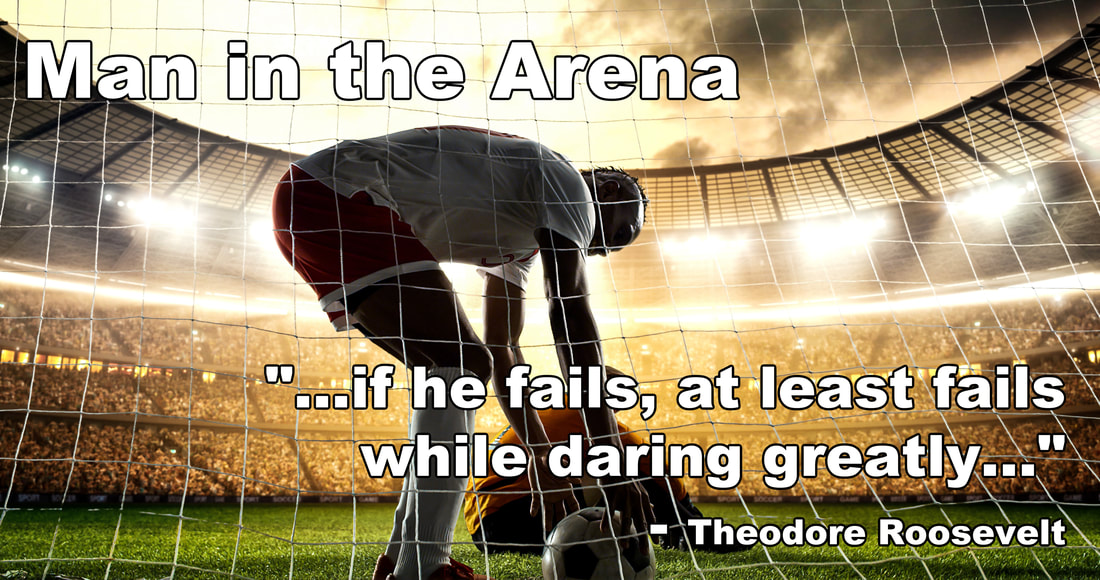Bridging Leadership Lessons from the Workplace and Those Experiences Shaping Today's Youth and Tomorrow's Leaders
 Update 2/19/24: In honor of President's Day, I am re-sharing this post because I reference Theodore Roosevelt’s speech featuring Man in the Arena. I will use the word “man” because it matches that of the original speech for continuity purposes, but the impact of a Strong Man or a Strong Woman is what I am talking about. Because as I have said many times before, Leaders Lead. As I was reflecting on this article, I thought about the critic who points out when “the strong man stumbles.” What Roosevelt was pointing out, without making it an obvious point, was that the critic sitting in the stands, is the “weak man.” It is not always easy to recognize the difference at first glance based upon their behaviors. Because the person in the stands is loud, confident and points out the flaws with courage because they are not facing the tests and competition of the arena. While those in the arena may go quietly about their business, competing and leading others with their actions. They may not be the person out front, but instead are hidden within the masses, motivating and inspiring from within. The weak person will look for ways to eliminate the strong not because they fear what the strong person says or does, but because they fear that the world will see the weakness that they know is inside them, which keeps them on the sidelines, and causes them to criticize the strong. The worst thing for any team or organization is when a weak person sits in a position of leadership. When that happens two things become clear: 1) the weak person will gladly throw people into the arena where they themselves fear to tread and 2) weak leadership is what allows a weak person to rise to a leadership position. It isn’t that the “strong man” doesn’t know fear, they do, but it is how they respond to fear that makes them strong. My childhood hero was John Wayne, and his quote is a great reminder about courage. “Courage is being scared to death but saddling up anyway.” - John Wayne. On this day, reflect on those who have chosen to be in the Arena and show respect to those leaders. If you have regrets of times that you chose to stick on the sidelines, find ways to enter the arena now and in new ways so that you can know triumph. I have had many conversations with people over this last year about the challenges of making sure we have a motivated workforce. These conversations occurred in a variety of industries and social circles. The opinions are too numerous of why it is a challenge and almost as many potential solutions that have been offered. But that is not what I am going to write about. For me, it comes down to a simple question, are you even in the game? Getting off the Sidelines Using sports analogies is always a great way to connect business and social interactions. People have long enjoyed games stemming from the excitement of participating and winning those games and contests. It moves from hide and seek, to memory games, from board games to athletic contests. But one thing for sure, there is nothing as exciting as being in the game. Watching on TV can be fun and emotional, but being at the stadium and feeling the emotions traveling through the crowd is euphoric. But even more than that, imagine the emotional roller coaster of adrenaline rush when you are the person taking the shot to win the game! I'm not sure if it is the result of an always on, always connected, instant gratification society, but it seems that the trend is for people to look for immediate results and recognition instead of grinding it out and fighting the good fight. Real success is not found in the “likes” on a Facebook post or a Tweet. That “virtual” success is a facade. The real success is found in the satisfaction from overcoming obstacles. It’s found in the opportunity to fail, so you also can have the opportunity to win. There is a saying that “respect is earned, not given” and showing up is a requirement of a job or role. Showing up doesn’t earn a person’s respect, instead it’s what you do when you show up. Just because we are in the information age and social media is ever present, it doesn't wipe away the foundational habits of success. Winston Churchill stated, “Continuous effort– not strength or intelligence – is the key to unlocking our potential.” During that same time frame, Jesse Owens, who is best known for his performance at the 1936 Summer Olympics in Berlin, Germany, by winning four gold medals, stated, “We all have dreams. But in order to make dreams come into reality, it takes an awful lot of determination, dedication, self-discipline, and effort.” The fear of failure keeps many people on the sidelines. By not playing the game, they never lose. But at the same time, they never have the opportunity to win. To feel that sense of accomplishment. To feel success. The Man in the Arena Former President Theodore Roosevelt (1901-1909),www.whitehouse.gov/about-the-white-house/presidents/theodore-roosevelt/ believed in “the life of strenuous endeavor” as his energetic approach to leadership and life was felt here and abroad. An avid outdoorsmen and adventurer, President Roosevelt did not shy away from challenges. He summed up his life in his famous speech now dubbed the “Man in the Arena.” The speech was given after leaving office in Paris in 1910 and was called "Citizenship in A Republic.” The speech was made popular in this modern area due to the 2021 documentary presented by ESPN on football great Tom Brady. "It is not the critic who counts; not the man who points out how the strong man stumbles, or where the doer of deeds could have done them better. The credit belongs to the man who is actually in the arena, whose face is marred by dust and sweat and blood; who strives valiantly; who errs, who comes short again and again, because there is no effort without error and shortcoming; but who does actually strive to do the deeds; who knows great enthusiasms, the great devotions; who spends himself in a worthy cause; who at the best knows in the end the triumph of high achievement, and who at the worst, if he fails, at least fails while daring greatly, so that his place shall never be with those cold and timid souls who neither know victory nor defeat.” So, are you on the sidelines or are you in the game? Are you watching others play or are you playing? Are you commentating or contributing? These questions are extremely important because as my mentor Steve Moles always reminds me, “the view is worth the climb.” So, when you are faced with the question of “are you even in the game” I hope that you choose to play, to enter the game, to enter the arena and by “daring greatly” may you feel the “triumph of high achievement” Beyond Today.
2 Comments
|
AuthorTom Brown - a husband and a father who is simply trying to make a difference. Using my experience as a Manufacturing Executive to connect leadership from the boardroom to the hardwood to help teams grow and develop to make a difference in the lives of others. Archives
May 2024
Categories |
Proudly powered by Weebly


 RSS Feed
RSS Feed

